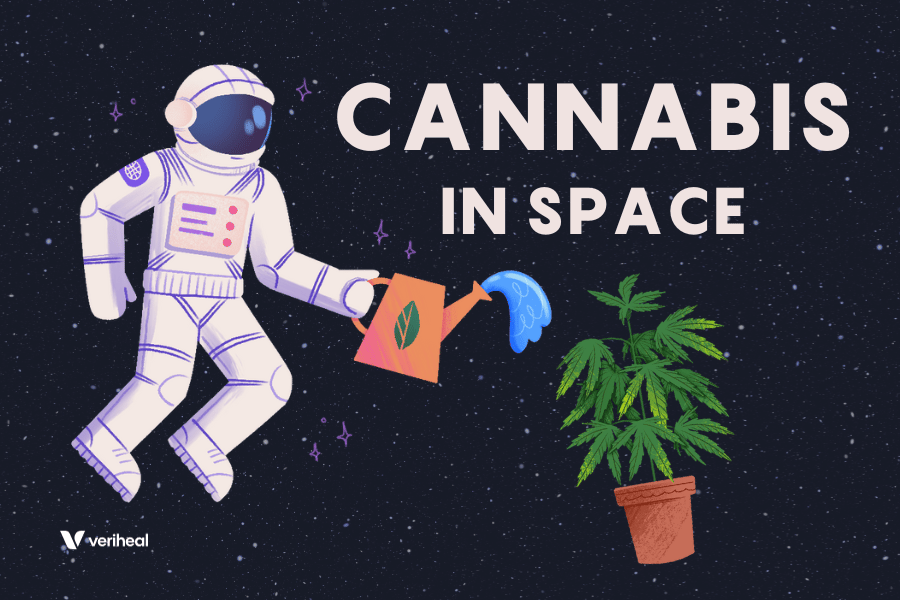From experimental technologies to cultural artifacts, we have seen a diverse series of payloads launched out of this world. Interestingly, several noteworthy endeavors have dispatched shipments of a particularly unusual cargo aboard spacecraft: particularly astrobotany with cannabis seeds and samples.
What is Astrobotany?
Plants have been embarking on extraterrestrial missions for decades. In 1966, the first seeds germinated in space within a Soviet ship. In 2019, sprouts from cotton seeds aboard China’s lunar probe became the first plants to germinate on another celestial body.
The researchers who study these extraplanetary botanical phenomena are in the field of astrobotany. This area of study investigates plant biology in space environments. Using experiments both on Earth and in space, astrobotanists seek to understand how plants react to the microgravity, altered oxygen levels, and ionizing radiation found in space.
Unsurprisingly, plants are unable to survive direct exposure to the conditions in the vacuum of space, so they are housed in human spaceflight systems, such as the International Space Station (ISS). However, certain space conditions can still affect the plants, and astrobotanical researchers are particularly interested in studying these changes.
Studies in this field have already yielded surprising discoveries about the effects of space travel on plant life. These findings will help feed astronauts on long-duration space missions, such as missions to Mars or beyond.
Why Try Astrobotany with Cannabis Plants?
The cannabis plants making the journey are technically specimens of hemp, which is a variety of the cannabis sativa plant species. Hemp plants were chosen for the journey because they are now legal for research purposes thanks to the 2014 U.S. Farm Bill.
Hemp is a rapidly emerging industry, and the plant has received increasing attention from researchers and manufacturers as a versatile resource with unrealized potential for use in industry, food, and medicine. By sending the plant to space, scientists hope to learn more about hemp’s biological properties. Whatever is learned from these expeditions will help growers on Earth develop more resilient hemp varieties.
Astrobotany Enterprises Leading the Way
Space Tango
Space Tango, a Kentucky-based space research company, was the first to send hemp seeds to the International Space Station (ISS) aboard a SpaceX rocket in 2019. After spending six weeks exposed to microgravity, the un-germinated seeds returned to Earth, where they are being cultivated and scientifically studied. Researchers intend to use the seeds to examine the possible effects of microgravity and space radiation on the plants’ growth, biochemistry, propagation, gene expression, and medicinal properties.
Why You Should Get Your Medical Marijuana Card
Veriheal has satisfied millions of patients nationwide by giving them access to these benefits
- Larger purchase limits
- Peace of mind
- Enhanced legal protection
- Access to higher potency strains
- Save up to 25% on cannabis purchases
- Skip the line at the dispensary
Although it is often believed that space is a zero-gravity environment, gravity is actually present everywhere in space. Microgravity refers to a kind of environment where the forces of gravity are very weak, and objects appear weightless. Since plants are terrestrial organisms adapted to the gravity conditions on Earth, the microgravity of space affects plant cells in ways that are consistent across biological entities. Microgravity also produces biological changes specific to plant life that differ across various plant species. The results are yet to be released, but the aim of the mission is to produce research that can improve crop cultivation on Earth and develop novel medicinal applications related to CBD.
Front Range Biosciences
Front Range Biosciences is a Colorado-based agricultural biotechnology company specializing in breeding genetically consistent hemp and coffee. In 2020, the biotech firm made history when more than 480 plant cell cultures of its coffee and hemp rode to the ISS on a SpaceX cargo flight. The plant cell cultures were sent in a special temperature-controlled incubator made for space.
Within the incubator, the plant cultures spent 30 days at the space station under the care of astronauts. The plants have since returned to Earth, where they are being studied by researchers from Front Range Biosciences. Researchers hope to discover whether the gravitational conditions of space produce genetic mutations or altered gene expressions in plants.
Redwire Corporation
The most recent developments involving space hemp come from Redwire Corporation. The aerospace and space infrastructure company plans to send the first commercially owned and operated space greenhouse to the ISS. The facility is supposed to be capable of cultivating plants from seed to maturity entirely in space. The greenhouse has not yet been launched, but the inaugural flight is projected to transport and house specimens of industrial hemp for a gene expression study.
Applications
Potential findings will contribute to the science of cannabis growing, astrobotany, and agriculture on Earth. Understanding how plants respond to a space environment advances the development of resilient and stress-resistant plants for other earth-bound crops. With this knowledge, agricultural technology companies are able to develop hardier varieties of important staple plants. As the planet’s climate changes, these discoveries will become increasingly important, since an increasing number of plants will no longer thrive in areas where they were once cultivated because of progressively stressful environmental conditions.
In the field of extra-terrestrial botany, projects like the hemp space studies propel humanity’s progress toward space agriculture. This will be crucial for long-term human-piloted missions where plants need to be grown onboard as food.
For the cannabis industry specifically, researchers hope to use the space study to innovate the process of growing new breeds of hemp plants for producing high-quality CBD. One interesting effect of microgravity on plants is that it removes the stress of gravity from affecting the plants. Experts suggest stress relief may conserve the plant’s compound reservoirs used to counter natural stressors. In the case of hemp, scientists are examining CBD.. The study will investigate if space conditions enable plants to preserve or enhance CBD concentration and potency. If successful, astrobotany could enhance cannabis-based medical products.
Altogether, the effort to send cannabis plants into space can serve humanity in numerous ways. Recent advancements in space exploration are making historical movements in the sciences — now cannabis is playing a part it’s part.
Author, Share & Comments
















